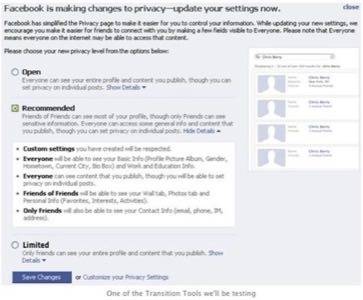In a late night post on Facebook’s company blog, CEO Mark Zuckerberg announced a round of upcoming changes that will affect all users of the social network. Specifically, the changes focus on new privacy controls for information sharing. For those who have been following Facebook closely, the announcement doesn’t deliver any new information, it only confirms some previously discussed plans. However, for Facebook’s user base, now 350 million strong, the updates represent a major overhaul as to how privacy is handled on the site.

Also check out ReadWriteWeb’s ongoing series on the top products of 2009:
- Top 10 Mobile Web Products of 2009
- Top 10 Consumer Web Apps of 2009
- Top 10 Semantic Web Products of 2009
Change #1: No More Regional Networks
Over the years, Facebook has grown from a tightly closed social network designed for connecting college students to an entirely open network which anyone and everyone can join. At first, Facebook’s privacy model revolved around “networks” – communities for your school, your region, or your company. “This worked well when Facebook was mostly used by students,” Zuckerberg writes, “since it made sense that a student might want to share content with their fellow students.” Over time, the company added more networks, including some for entire countries. But now, thanks to Facebook’s ever-growing popularity, these “regional” networks have grown so large that some have millions of members.
The problem with networks of this size when it comes to privacy is that people who had opted in to sharing content with their network (via the setting share with my “networks and friends”) were inadvertently be sharing personal updates with far more people than they intended to. To address this issue, Facebook demoted cities and regions from being considered networks although the information still exists in user profiles, listed under “Current City” and/or “Current Region.”
This update isn’t exactly news – the company revealed their plans to remove regional networks back in July of this year. Zuckerberg’s mentioning of this update seems to be more of a confirmation that indeed, this process is underway, than any sort of major announcement about a new direction for Facebook.
Change #2: Control Who Sees Each Piece of Individual Content You Add or Upload
A second privacy update involves Facebook’s plans to allow its users more control over individual pieces of content uploaded or added to the social network. This control will be implemented on a per-post basis through a mechanism dubbed the “Publisher Privacy Control.” Simply put, this change adds a new feature to the publisher box on Facebook – aka the status update box. From here, Facebook users post their status, upload photos and videos, and share links. At the moment, when you click the “Share” button, who sees that content is governed by settings tucked away under a cavalcade of menus (Settings -> Privacy Settings -> Profile -> Status and Links.)
With the the upcoming Publisher Control functionality, already in beta testing, a new button featuring an image of lock will appear beneath the status update box. Click on this button and you’ll be able to choose precisely who is allowed to see that update or other piece of content (“everyone,” “friends,” “friends of friends,” etc.)

Change #3: A Simplified Privacy Page
Facebook’s granular privacy controls have always been sort of a blessing and curse for the social network. Although savvy users could drill down into each individual setting and adjust it to their needs, the majority of the site’s users don’t even know where these settings are, much less how to change them or to what. The problem, as noted above, is that many of the privacy settings are buried in a series of complex menus. Even if you can find the Privacy Page, the drop-down boxes and their lists of choices stump average users who aren’t sure what a setting like “my networks and friends” really means.
To make privacy simpler, Facebook’s controls will be changed to permit sharing with three groups: “only friends,” “friends of friends,” or “everyone.” In addition, the Privacy Page itself will be simplified to combine some settings which currently overlap. This, too, was announced in July.
Although neither post details specifically what settings will be combined, a quick glance at the Privacy Page allows for some speculation. Perhaps the “basic info” and “personal info” boxes will become one? There really isn’t that much distinction between the two, despite what their names imply. For example, “basic” information includes what many consider “personal” information such as birthday, hometown, and religious views. Meanwhile, the so-called “personal” information setting controls more innocuous content like favorite books and movie. The “Photos Tagged of You” and the “Videos Tagged of You” settings also seem like worthy contenders for combination. It seems that you’re either okay with people seeing content you’ve been tagged in by others or you’re not. Whether that’s a photo or video doesn’t really matter to most. However, these are just guesses, mind you – until the update goes live, there’s no way to tell what will and will not be changed.
How the Transition Will Occur
Although not mentioned by name in Zuckerberg’s blog post, the July post mentioned a new “Transition Tool” that would be rolled out to users to aid them in configuring the new settings. This is likely what Zuckerberg was referring to when he noted that “we’ll suggest settings for you…” With the Transition Tool, users are prompted to pick from different privacy level options like “open,” “recommended,” or “limited.” According to the recent post, the recommended settings will be based on your current level of privacy but you’ll be able to read through the other options to make changes if you so desire.

Beginning with a small group of users, Facebook has been testing six different versions of this tool to determine what works best. Based on feedback from the group, the testing tool will be refined to a final version before all the changes are made available to the entire network. However, since the recent post made no mention of a timeline for these changes, the implication is that these new updates are not going live just yet. Instead, the post was merely setting the stage for what’s to come.
Why Facebook Cares About Privacy
It’s good to see Facebook taking the issue of privacy seriously. Although it’s easy to blame the user for over-sharing and then having to deal with harsh consequences like job loss or even, remarkably, the loss of health-care benefits by sharing some items too publicly, at the end of the day, affected users will not blame themselves, they will blame Facebook. And those reading these “social network horror stories” in the media could ultimately become too afraid to post to the site, leading to a less active user base, or worse – users deleting their accounts.
Privacy issues are bad news for Facebook, just as they were bad news for MySpace back when they were king. For years, there were so many news stories about sexual predators on MySpace that eventually the public perception of MySpace was that the network wasn’t very safe. Instead of going that route and allowing the media stories about Facebook blunders to control the network’s public image, these privacy changes are designed to preempt the missteps and mistakes the not-so-savvy user base may make by making Facebook privacy simpler and more refined while also more representative of the large network Facebook has become.
ReadWriteWeb’s Best Of Lists for 2009:










